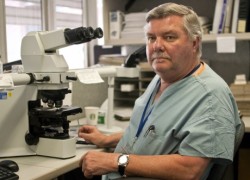
The economic and political ideas that Soviet leader Vladimir Lenin put forth during his life are widely debated, but the subject of his death is less often analyzed.
Earlier this month, experts gathered at a clinicopathological conference at U. Maryland to discuss that very issue.
The participants in the conference – including Dr. Harry Vinters, a professor of pathology and neurology at the UCLA David Geffen School of Medicine – were given Lenin’s autopsy report and a list of Lenin’s symptoms before death.
Lenin, who died when he was 53, had several strokes at an early age, and an autopsy showed that he had severe vascular disease, said Vinters, who researches cerebral vascular disease and strokes at UCLA.
Clinicopathological conferences such as the one held at U. Maryland are events where experts look at the symptoms of a patient.
They are also teaching opportunities, with medical professionals presenting how they went through the process of finding a diagnosis to an audience which includes medical students and residents.
Vinters said he has participated in clinicopathological conferences before, but he had never looked at the case of a historical figure.
The patients analyzed in other conferences are usually regular people, but this conference stands out because of the high profile and historical nature of the cases, Vinters said.
In past years, experts have been called upon to determine the cause of death of people from history, such as Joan of Arc and Edgar Allan Poe.
This year, Lenin, the Russian Marxist revolutionary and first leader of the Soviet Union, was chosen as the subject of the conference.
Lenin also had a family history of cardiovascular problems, and was under a tremendous amount of stress amid political power struggles in the last few years of his life, Vinters said.
Given all of this information, Vinters said there is no doubt that Lenin suffered from severe vascular disease.
Vinters added, however, that there is still an open question as to whether or not Lenin ultimately died as a result of a stroke.
Also present at the conference was Lev Lurie, a Russian historian. Lurie has proposed that Lenin may have been poisoned by his successor, Josef Stalin.
“Stalin was very ambitious,” said Vinters, who added that allowing Lenin to recover from the health problems that he was having in the time before his death was a risk to Stalin’s political aspirations.
Close to his death, Lenin grew more suspicious of Stalin’s efforts to collect power within the Communist party, said Daria Khitrova, a professor in the Slavic languages and literatures department at UCLA.
No toxicology report was done at the time of Lenin’s death, so the possibility of poison was not ruled out during the autopsy, Vinters said.
Also, Lenin did not smoke or drink excessively, Lurie said, which makes his vascular health problems more puzzling.
Memos written by Stalin were also found in which Stalin asked the Soviet government to poison Lenin, claiming that Lenin wanted to commit suicide, Lurie said.
Both the medical and historical points of view were presented at the U. Maryland conference, but no consensus was reached as to whether Stalin was successful in poisoning his predecessor or if Lenin died from cerebrovascular problems.
